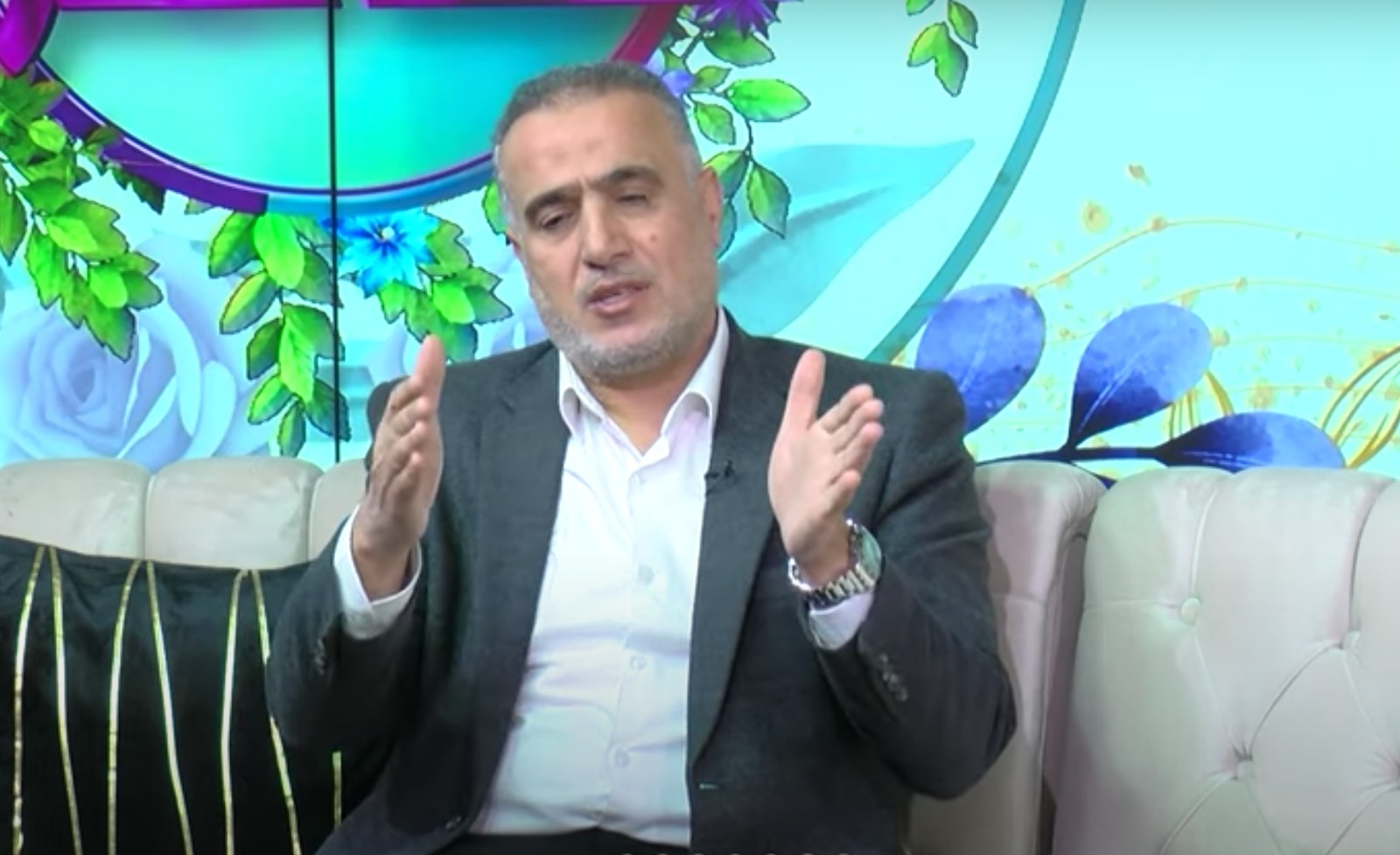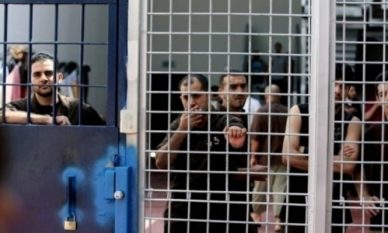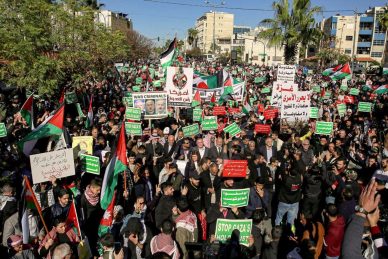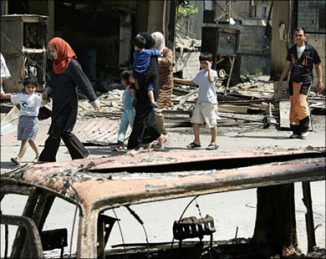AMMAN, (PIC)
“When I left Gaza, I felt like someone fleeing a battle. We left them in the battlefield alone,” with these words filled with pain, anguish, and a sense of great responsibility, Jordanian doctor Wasfi Ja’ara, a general surgeon, laparoscopic surgeon, and member of the Jordanian medical team supporting the people in the Gaza Strip, expressed his deep sadness when the mission ended after spending only two weeks in the enclave.
He continues, “Each one of us wishes to return to Gaza to fulfill our duty, even though what we did when we were there was far less than what was required.”
In an interview about the tasks performed by the medical team he accompanied, Dr. Wasfi Ja’ara describes his mixed feelings of joy, love, pain, brotherhood, friendship, and the beautiful relationships he built with the medical team at the European Hospital in Gaza, as well as with the patients and their families. He recalls the wonderful times they spent together under the bombardment and the sound of missiles.
“The missile whose sound you hear won’t hit you,” he says jokingly. He learned from the doctors in Gaza the words “don’t worry, when hearing the sound of a missile (that means it) won’t harm you.” He affirms that this recipe, which the people of Gaza carry of bravery and strength, removes fear from the heart and brings reassurance, especially when you hear the sound of missiles, as it means you are still alive.
In further detail, Ja’ara confirms that the medical team accompanying him consisted of ten doctors from Jordan and ten doctors from the United States under the supervision of the Rahma Relief Foundation, with various specialties. They managed to enter Gaza through the Rafah crossing, coming from Cairo on the seventh of February at seven in the evening.
He continues his narrative, saying: “We noticed a huge number of trucks parked on the sides of the road, idle for more than two months, along a ten-kilometer stretch. We were received at the crossing in Gaza and went directly to the European Hospital, where we worked.”
He adds, “The intention was to go to the Al-Aqsa Martyrs Hospital, but we were advised to stay at the European Hospital, and the decision was made by the head of the delegation to stay there.”
He expressed his profound pain over what he witnessed on his way to the hospital, the evident and severe destruction, the destroyed streets, primitive means of transportation on damaged roads, constantly under threat and exposed to shelling at any time. He recounts the condition of Salah al-Din Street, which became completely destroyed, along with its factories and buildings.
“The healthcare sector is destroyed,” he said. He talked about the state of the healthcare sector and the real catastrophe it has reached, with only the European Hospital remaining out of more than 35 hospitals. “Even the Nasser Medical Complex was invaded by the (Israeli) occupation army while we were there.”
He says, “Only four functioning hospitals remain in the Gaza Strip: Al-Shifa Hospital, Al-Kuwaiti Hospital, Al-Aqsa Martyrs Hospital, and the European Hospital.”
Ja’ara continues, “The European Hospital has a capacity of 200 beds, and there are 900 patients there. Most of them stay in the hospital after being treated because they have nowhere else to go as their homes were bombed. After being treated, they remain, which has made the hospital overcrowded due to the large number of patients and their families filling the corridors and the hospital grounds.”
He describes the scene inside and around the hospital saying, “extremely primitive tents where the displaced people sleep, with six to eight people in a two-square-meter space, while more than thirty thousand displaced people are present in one square kilometer.”
He points out that the humanitarian situation inside the hospital is very difficult, where you may have to wait for two hours to use the bathroom without the slightest sanitation conditions, and the cost of living exceeds imagination.
And regarding the immense pressure on the European hospital, Ja’ara says, “The cases that are treated in other centers and hospitals in Gaza are transferred to the European hospital because it is the only hospital today that has intensive care and operating rooms.”
He continues, “However, the medical staff there is very exhausted and under tremendous psychological pressure, and many of them have lost their relatives. They pray for them and return to work. He also points out that some doctors have been present at the European hospital for more than two months because there is no place to accommodate them.”
Boosting morale is important
He emphasizes that the presence of medical delegations psychologically relieves and supports the doctors there. They have great expertise, but it is also very exhausting.
He praises every doctor who goes to Gaza to help, as they have a message and principle, and they deal with the situation with comfort and without complications.
He notes that “there is a shortage of everything in the hospitals, and the challenge is that you work with fewer resources than required.”
The most beautiful dinner I have ever tasted in my life
He narrates about a dinner session that he describes as the most beautiful dinner he has ever tasted, and what happens during it, and how it raises the morale of the doctors in Gaza after they felt forgotten.
He adds, “You hear the sound of shelling while working, and the medical staff works with ease and strong morale, without fear. We learn patience from them, and they always praise Allah, no matter how many of their families are martyred. The word ‘Alhamdulillah’ makes you feel how great the people of Gaza are.”
He notes that the medical aid delegations bring medical assistance with them when entering Gaza, and this assistance is crucial and makes a difference in the capabilities of the hospitals.
He points out the good relationships that the medical team has built with the patients, and one of them, whom they got to know during a session, sang a very beautiful song with his poignant voice, and they listened to him during one of the private sessions of praising the Prophet Muhammad and singing hymns.
With all this pain, destruction, resilience, and mixed emotions, Ja’ara affirms that the smell of bread made in a primitive way had a special impact on him.
The hardest thing was leaving Gaza
He recounts moments of extreme sadness when the real moment of leaving Gaza came, describing it as “the hardest moments.”
He said that the humanitarian mission alongside the medical mission they carried out and the upliftment of morale were of utmost importance, as there becomes a wonderful bond between you and the people of Gaza, and when we bid farewell to the doctors with teary eyes.
He highlighted the generosity and greatness of the people of Gaza, saying, “Every day, the doctors would call us and ask why we didn’t join them for dinner, and we felt ashamed of them. How can we share these few cans with them?”
Ja’ara added, “We had coffee and sweets” that were not available in Gaza, and when we sat down to have them with our colleagues, we felt a kind of amazing spiritual unity and a brotherly bond that went beyond fellowship. The moment of farewell was very difficult, and some doctors cried.
The end was marked by a smile on the faces of the children
Regarding those beautiful moments they spent joyfully with the children in and around the European hospital, Ja’ara said, “We concluded our activities there with a party for the children, who are exposed to all the shocks and great psychological pressures.” One of the doctors told me, “If I had known, I would have brought my children here because of the beauty of the party and the joy that filled the place.”
But moments of joy with the people of Gaza do not last long. The Jordanian doctor, Ja’ara, says, “The moment of departure is very difficult, why should I leave? And whom do we leave behind? Although, from a good perspective, we may offer very simple things in light of their great experiences, and they are capable of carrying out the very difficult task perfectly. What we saw this time was not like any previous war, but our presence with them was a morale boost.”
He continues by saying, “It is only the lack of resources that makes their mission difficult … and you don’t find the ability within yourself to leave them.”
Ja’ara concludes by describing the moment of intense sadness he felt upon departure, saying, “After the end of any journey, a person feels happy, except for our journey to Gaza. I didn’t feel happy upon my return home, but rather a feeling of pain for leaving our people and brothers.”














